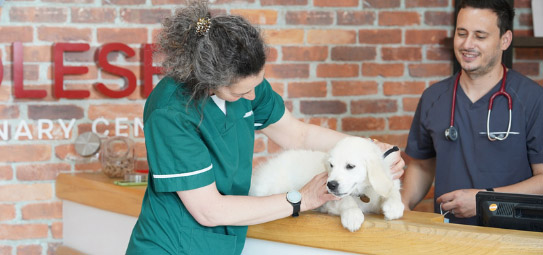
Get Molesey Vets’ advice on springtime dangers for dogs, cats & rabbits
March 14, 2022
Dogs, cats, and rabbits have many differences, which is why we choose them as pets. However, as the spring season gets underway and the flowers start to bloom, these three species have a few things in common… The team at Molesey Vets are sharing advice on common dangers that can affect all pets this season.
To help owners of dogs, cats, and rabbits further, Molesey Vets’ nurses have pulled together some extra tips for keeping pets happy and safe in spring – download these below.
Download our Spring Safety Tips
Be aware of these common spring dangers
Parasites
Dogs and cats are prone to catching fleas if they are not regularly treated with vet-recommended parasite prevention products – ask us about these. Fleas can be difficult to get rid of as they lay eggs and multiply extremely quickly, living in your carpets and furniture as well as on your pets. Worms can be problematic too if your pet isn’t treated regularly. Lungworm in dogs can be fatal – get tips about this and other spring safety advice here >
Rabbits can get fleas and worms too, but they are mostly a target for flies. Flystrike in rabbits occurs when blowflies (green & blue bottle) lay their eggs on or near a rabbit’s anus, after being attracted by faeces and urine. The hatched maggots then feed on the rabbit’s flesh. Flystrike is a painful and life-threatening condition. A clean and dry rabbit and hutch will be less appealing to flies.
Diseases
Parvovirus, Distemper, Feline Leukaemia, Cat Flu, Myxomatosis, and Viral Haemorrhagic Disease (VHD) – these are just some of the life-threatening contagious diseases that pets are at risk of. All of these diseases are preventable through annual vaccination.
Our Vet Darren Partridge advises that vaccinating your pet not only protects them, but protects other pets too by reducing the spread of disease. Parvovirus and VHD can be carried on inanimate objects including shoes, car tyres, clothing, and food bowls.
Poisons
Common spring pet poisons can be found in many homes and gardens in Molesey. Spring is synonymous with spring cleaning, indoors and out, and this can mean many toxic substances being left where pets can access them. Keep products out of reach and behind closed doors when they are not in use.
Many garden and house plants are poisonous too – do a search online for ‘poisonous plants for rabbits’ or ‘plants that are toxic to dogs’, or cats. Do you have any of these? Common culprits are lilies, foxgloves, rhubarb, daffodils (bulbs especially), and tulips. For the safety of your pets, Darren recommends removing them or putting in measures to ensure your pets cannot reach them.
Now to an extremely common poison this time of year – chocolate! With Easter on the horizon, there is likely to be more chocolate in your home than usual. Chocolate is extremely toxic to all pets and should always be kept well out of reach. If you think your pet could have eaten any, contact us straight away on 0208 979 1384 – we are here to help in an emergency 24/7.
We hope you found our information on springtime dangers useful. Get our extra Spring Safety Tips for dogs, cats and rabbits here:



